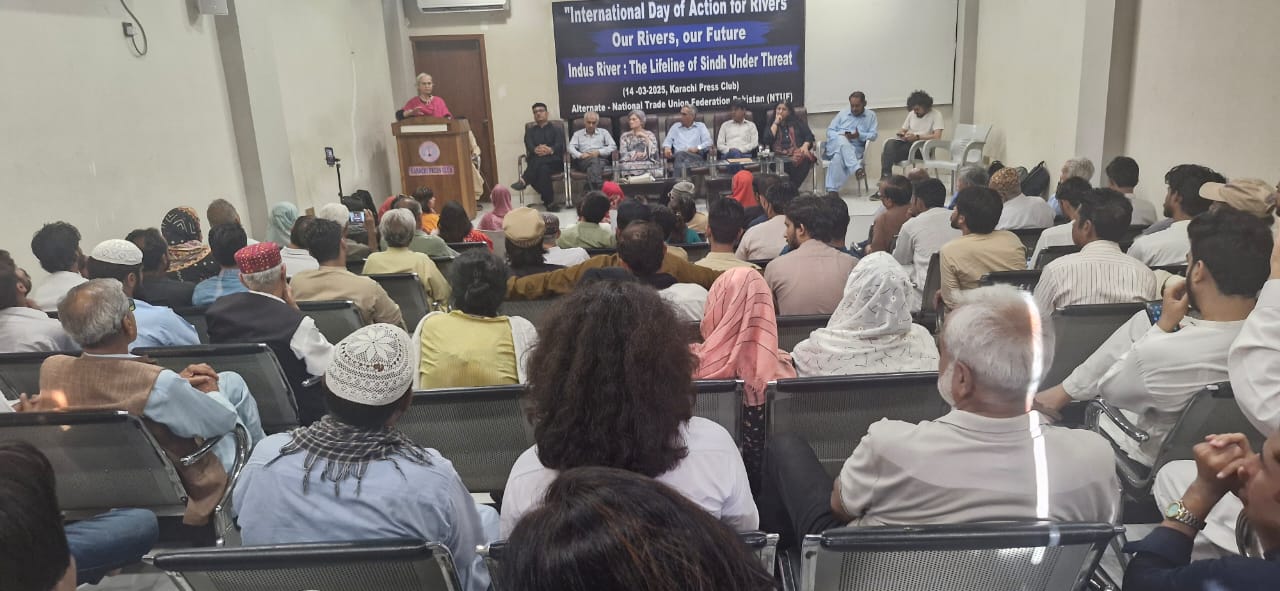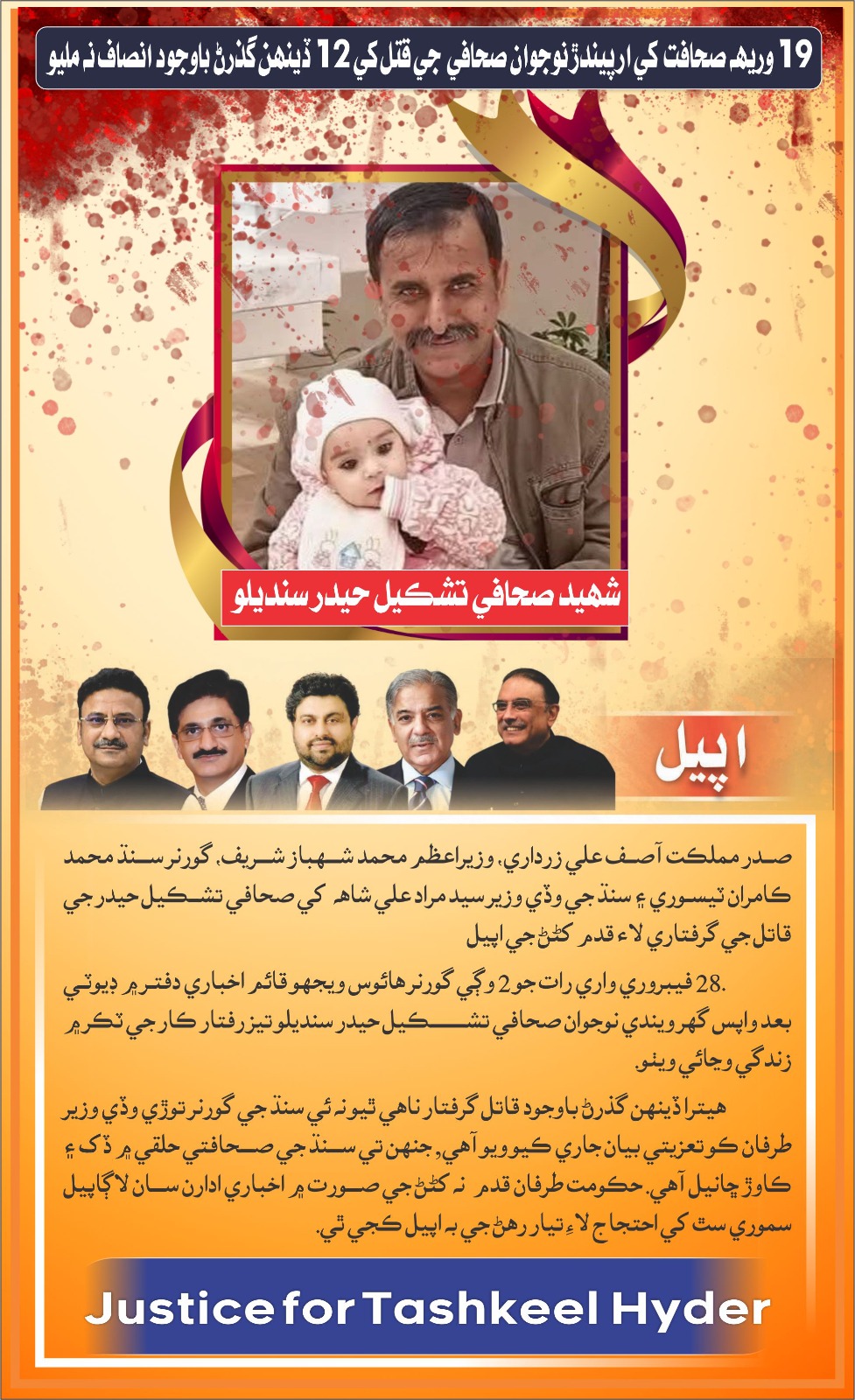'Rivers Are a Living Reality; Blocking Their Natural Flow Is a Crime Against Nature,' remarks NTUF - Alternate seminar against 6 Canals project at KPC
KARACHI (Press statement): "Rivers are a living reality, and
obstructing their natural flow is both a crime and an act of ecological
self-destruction. Water aggression is not just an attack on the federation's
foundations but also a catastrophic threat to the entire region. The
destruction of the Indus River is not merely a matter of Sindh's survival; its devastation
will push 250 million people into hunger, poverty, and environmental collapse.
Supporting the ongoing mass resistance in Sindh to save the Indus River from
annihilation is a historical duty of every individual, group, and nation
concerned with its future."
These views were expressed by prominent intellectuals and public
representatives during a seminar titled "Indus River: The Lifeline of
Sindh Under Threat" organized by the National Trade Union Federation
Pakistan (NTUF) and the youth organization Alternate on the occasion of the
28th International Action Day for Rivers at the Karachi Press Club on Friday.
The event was presided over by NTUF Secretary General Nasir Mansoor.
Mansoor said that Pakistan's coastal areas were once home to the
world's seventh-largest mangrove forests and that the Indus Delta was the
world's fifth-largest delta. He added that the Ramsar Convention mandates the
protection of islands, deltas, and coastal forests, with 10 out of Pakistan's
19 Ramsar sites located in Sindh. Violations of this convention had led to the
destruction of the delta, marine forests, and islands, further worsening the
ecological crisis, he said.
Home Based Women Workers Federation Secretary General Zehra Khan
emphasized, "The river is a living being, and if you hurt it, it will
react. In Thatta and Badin, we can already see the ocean eating away the land.
The river should not be touched." She warned that the 6 Canal project is
like suicide bombing, first affecting Sindh and then everyone in its path, and
will contribute to climate change. Khan noted that an unaware public becomes
the enemy's biggest army.
She further explained that big dams are not acceptable worldwide,
pointing out that Tarbela Dam affectees are still awaiting compensation while
Mangla Dam affectees were given UK visas only. According to Khan, when Punjab
was divided, there were two headworks, and after India stopped the Sutlej flow,
an agreement was reached where India would gradually reduce water flow.
"Our three rivers were sold to India through World Bank mediation in 1954
– Eastern rivers to India and Western rivers to Pakistan," she stated.
Academic Sajjad Zaheer said that NTUF and HBWWF have clarity on
Sindh issues. He mentioned that they are fighting against the 6 Canal based on
Marxist philosophy. Zaheer pointed out that the Hakra river has disappeared and
canals have been carved out of the Indus River many times in the past. He
recalled how Sindh resisted against the Kala Bagh Dam.
"Without water, we will face devastation. Seventy percent of
revenue comes from agriculture," Zaheer noted, adding that this is not
just a matter of the Sindhi language but an issue for everyone. He criticized
the PPP and President Asif Zardari, mentioning that the Sindh government was booking
protesters under the anti-terrorism act. Zaheer concluded that they are weak at
this time because of the Pakistan Electronic Crimes Act, which is being used to
crush dissent.
Tabassum Khoso of Imdad Foundation spoke about the need to wage
this struggle collectively, stating that without unity, there is no gain in
either political or civil society. Khoso observed that the ocean is engulfing
Thatta and Sajawal, and called for Karachi to stand up as these are issues
affecting everyone. "Sindh water belongs to Sindh, not Punjab or any other
province," Khoso declared, pledging to continue fighting to protect the
Indus River and its water for Sindh.
Journalist Mehnaz Rehman warned that corporate farming will
adversely affect Sindh. She explained that subsoil water is killing fresh water
and no river has been affected like the Indus River. Rehman traced the problem
back to the British era when they made Canal colonies. She noted that a water
crisis is looming while the population continues to grow, and emphasized that
farmers are finding it difficult to water their lands. "These canals are
illegal," Rehman asserted.
Social influencer and activist Ali Ahmed Jan explained that the
Indus River originates from Gilgit-Baltistan, and in the Shina language, the
word used for river is "Sindh." He stated that GB people did not need
a dam and when people resisted the Bhasha Dam, they were labeled as traitors.
Jan pointed out that projects in GB are destroying the environment, with
displaced mountains causing deadly rockfalls. "So-called development has
become destruction for people," he concluded.
Intellectual Aman Ullah Shaikh observed that nationalism is
gradually taking the shape of chauvinism. He described themselves as
representatives of city nationalism and pointed out that after partition, the
Sindh middle class Hindus were forced to leave their homes, yet today they
stand together with the current middle class. Shaikh stressed that until the
middle class seriously involves itself in politics, there will be no change.
Academic Dr Asghar Dashti highlighted that water is not reaching
the Indus Delta due to obstruction, causing climate-induced migration. He
characterized the Green Pakistan Initiative as an imperialist project
benefiting the ruling class while the working class bears its brunt. Dashti
called for unity in the struggle and noted that Karachi people are not
adequately sensitized about this issue. He criticized the Sindh government for
changing its statements regularly on the issue without providing clarity.
Academic Dr Riaz Shaikh criticized the state for not learning from
past mistakes. He mentioned that universities have been instructed to organize
student rallies against the Baloch insurgency, calling this act shameful.
Shaikh explained that the 6 Canal was proposed under the pretext of making the
Cholistan area green for an agricultural revolution, comparing it to Ayub's
failed green revolution. He held WAPDA responsible for the country's water
crisis and called for its audit, noting that it has only been run by military
personnel with no civilian chairman appointed. "The 6 Canal is a guise for
letting the elite conduct real estate business," Shaikh asserted, calling
for modernization of the water distribution system and for state institutions to
work independently





Comments (0)